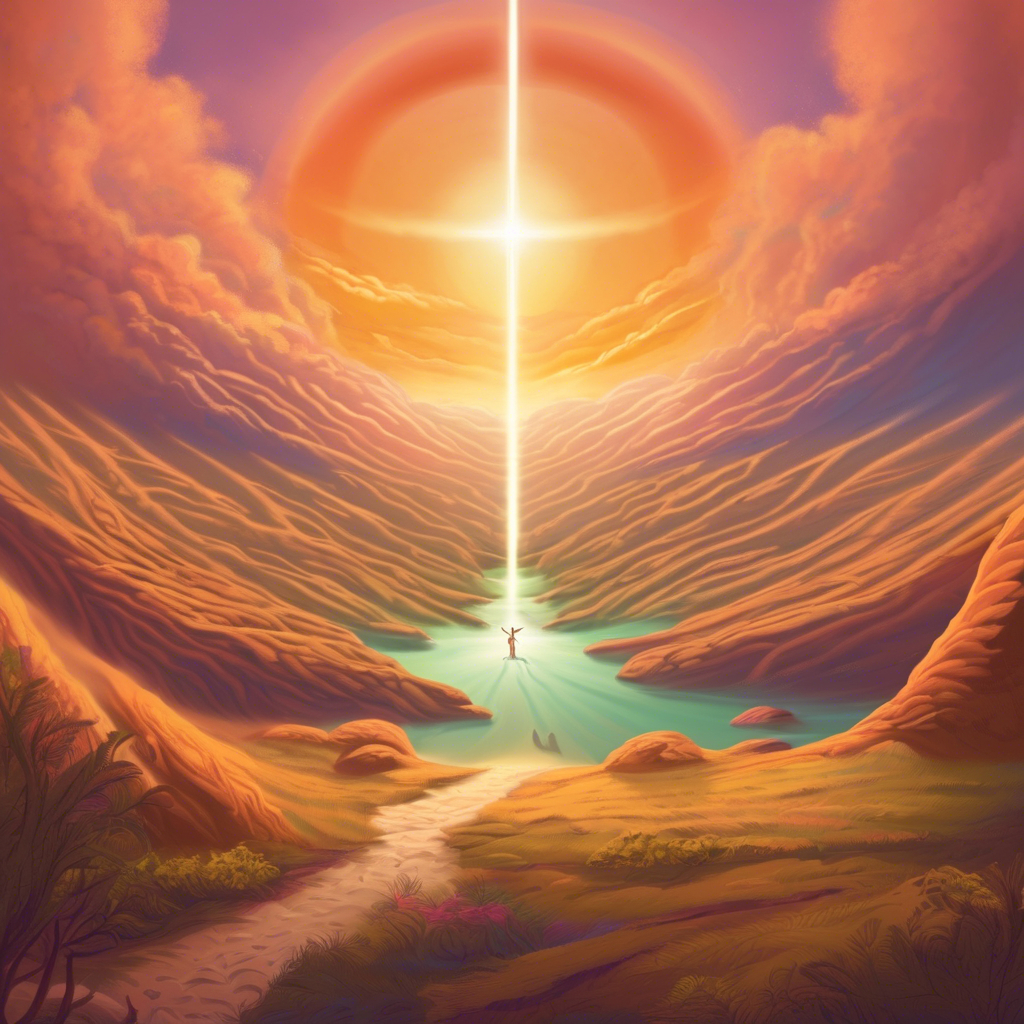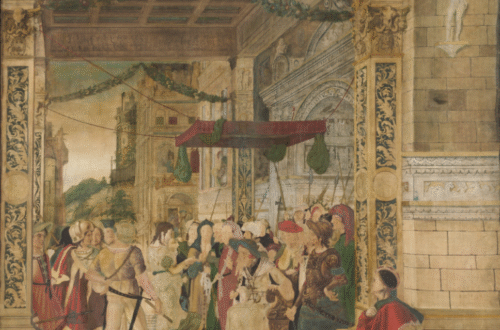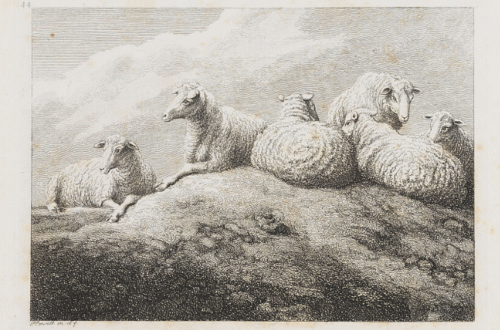26 Then God said, “Let us make man in Our image, according to Our likeness; let them have dominion over the fish of the sea, over the birds of the air, and over the cattle, over all the earth and over every creeping thing that creeps on the earth.” 27 So God created man in His own image; in the image of God He created him; male and female He created them. 28 Then God blessed them, and God said to them, “Be fruitful and multiply; fill the earth and subdue it; have dominion over the fish of the sea, over the birds of the air, and over every living thing that moves on the earth. (Genesis 1:26-28, NKJV)
When looking at the text in Genesis 1, we see that God says, “Let us make man in Our image, according to Our likeness…” You might be thinking, “who is the ‘us’” in this scripture? Scholars today have interpreted this in various ways. Terence Fretheim, author of The New Interpreter’s Bible (1994) suggests God, along with a “divine realm” was responsible for this creative process and many scholars agree with him. However, others, like myself, would interpret the “us” as a reference to God, Christ, and the Holy Spirit. This is believed through interpreting the text from the Gospel of John:
1 In the beginning was the Word, and the Word was with God, and the Word was God. 2 He was in the beginning with God. 3 All things were made through Him, and without Him nothing was made that was made. (NKJV).
This is interrupted to say that Christ was present before the world began and assisted in the process of creation. Assuming now that God, Christ, and the Holy Spirit are present in the creation of humankind, what seems equally important is that we were created in the image of God.
A whole area of theology has been devoted to the study of the “image of God,” where some scholars even throw around the term, imago Dei, which is Latin for “image of God.” Further, we know that there are several popular religions in the world that go beyond man being created in the “image of God,” to say that humanity will eventually become God. Of course, the idea that humankind will evolve to become a god is not Biblical, and is bothersome to traditional Christians. We are also repulsed by the suggested theory of evolution, because none of us want to see our God as a glorified ape-man.
To be created in the image of God is more interpreted as “likeness.” Man is not God, but is like God. Man “reflects the divine nature [of God] within his humanity. Man, mankind, womankind, humankind are created in the image and likeness of God. Whereas, one could probably spend a great deal of time and energy focusing on this idea and the multitude of ways our lives reflect the life of God, or Creator, and our Father. The main attribute, we have been created to create.”
When we think of creation, we think of artists. Artists are not merely those who paint or draw. Artists are people who create, compose, and write music. Artists are people who make designs that lead toward advanced technology. Artists may be the people who make quilts, who create delicious meals, and who put together lovely arrangements of flowers. Artists may be the mechanics who are gifted at fixing things or the carpenters who are gifted at building things.
Artists are equally as well people who create new methodologies for doing effective ministry. Mentioning the doings of effective ministry, leads into the frustration some pastors experience with the church today. This frustration is witnessing the church as a place that destroys creativity.
If humans were created in the image of God, we see quite plainly that we have been created to create. For most of us, we can quite plainly say at some point in our life: “I made that,” or “I created that!”
Here is where the traditional churches destroy creativity. At one time there was creativity. Someone came up with an idea, or a program; it was tried; it was successful; and everyone liked it. But then, someone decided this is the way it has to be done and year after year, decade after decade, someone else would say “this year, let’s try doing this.” They were immediately cut down by a person or group of persons who proclaimed in unison: “This is the way we’ve always done it. This is the way it has to be done.” The biggest issue with this is that when people act this way toward another, we are not simply destroying creativity, we are killing the person God created them to be.
It’s almost like murder. God created us to create. He gifted us with creativity, and placed within us a burning desire to go forth and make accomplishments. Then, God started us down the road of creativity, he said “Be fruitful and multiply” (Genesis 28). Then, Jesus said in Mark 16:15 (NKJV):
15 Go into all the world and preach the gospel to every creature.
But, then someone decided if you’re going to preach the gospel, your sermon needs an introduction, three main points, and a conclusion. Someone decided the sermon would be delivered in a church building. A building with pews, a pulpit, a choir oft, an organ, and a piano. A church has have a narthex, a place for greeters and a guest book to sign. A church has to have a cross hanging on the wall, a baptistery, and a communion table. And on the communion table, there is a proper way of setting the table, and by golly, you’d never not goof that up. And, so with all this arrangement by which we call the church, if someone came up with a creative idea for change, we would say, “this is the way we’ve always done it. This is the way it has to be done.”
In Genesis 1:28 (NKJV), 28 Then God blessed the, and God said to them, “Be fruitful and multiply; fill the earth and subdue it; have dominion over the fish of the sea, over the birds of the air, and over every living thing that moves on the earth.
Mankind was given dominion over all the other creatures of the earth. Defining the word, dominion, we could also add power and authority. The creator has created a special creation, humankind, to create and have power and authority over the rest of God’s creation.
At one point in my ministry career, we lived in a parsonage in La Junta, Colorado. After living there a year, we discovered a terrible problem. We had an overpopulation of pigeons. These pigeons were terribly messy. They left droppings all over the roof, the sidewalks, our cars, and everywhere else. So when I sought out help, there was no Save the Pigeons society (that I was aware of). There was no one willing to relocate these pigeons to a more suitable environment. I called an exterminator and was informed with a hefty price, he would come and poison the pigeons with poisoned food. The drawback to that was that other birds might be poisoned in the process and the poison would only last for a time.
Being a person raised in a farming community, I instead elected to buy a BB gun and proceeded to have dominion over these pigeons. At the end of the year, the pigeon population was under control, as I had officiated over the funerals of at least nineteen pigeons that year.
Is this story a confession of my sins? Not really. I have no remorse over saying farewell to these pigeons. While I do like animals, I’m not an animal rights activist over pigeons. My faith will remain to believe that I am a special part of God’s creation – doing what I was called to do as part of the dominion, care, and authority of the human race.
In conclusion, it is our purpose to create! The ministries and the church should exist to inspire people to continue to create. Considering the great commission of taking the gospel into all the world, we need the creativity of the saints to invent new ways for getting the job done. God has assigned us all a gift, and he will hold us accountable for it. If we don’t use our creativity, God will see us as non-productive. Even worse, if we don’t use our creativity, we are going against what God has created us to be. So, let’s commit ourselves to be all that we can be or our Lord.
Title: Formerly “Created to Create” | Sermon: March 23, 2003, First Christian Church Paradise, California




